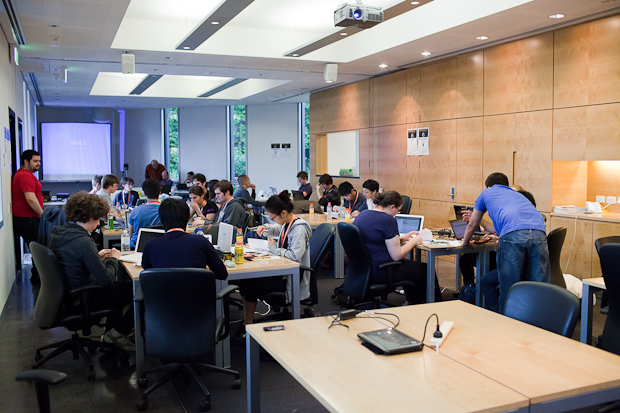Academics tap into 'hackers' for apps

Unless they're working in an IT-related field, most science academics don't have the time or knowhow to code up applications that might help them with tasks such as searching and manipulating data from journals. One university used a resource at its fingertips to solve the problem.

(Credit: Michael Lee/ZDNet Australia)
Over a 24-hour period on the weekend, Sydney University played host to a "Hackathon" co-run by the Sydney University IT Society (SUITS) and software vendor Elsevier. In this context, the definition of a hacker goes back to its traditional meaning — someone that wants to understand the workings of computers and programming and builds, or "hacks", code to improve it and themselves. Other organisations have held hackathons, such as Atlassian's FedEx day, so named because those participating have to deliver an app overnight. This event, however, was the first to be held by the university.
Students were challenged to see what they could build on Elsevier's SciVerse platform, which academics use to search through journals and other sources for papers and information. Elsevier developers were also present at the event to help the students implement ideas. Examples of code that have come out of past hackathons that Elsevier has held include an application that scraped table information from papers and placed them in a comma-separated values (CSV) file, text-to-speech applications, visualisation tools such as tag clouds and integration with social media.
The event provides academics with a significant benefit — there are few opportunities where a group of about 40 highly motivated hackers will do three days of coding for just $3500 in prize money. Of course, the students were fuelled with meals, caffeine and an Xbox gaming console, but they also gained something else.
Elsevier director Vishal Gupta said that students retain their intellectual property, and the company provides seed funding to help students develop their applications, if it is needed. It has already provided small amounts of between $1000 and $1500, enough for two weeks of work, to hackathon participants from the National University of Singapore.
SUITS president James Alexander said that the opportunity to work with experienced professionals made it well worth the time.
"Sitting in a lecture theatre, you don't often get to meet with other real-world developers over a serious, long period of time. Often, we'll go visit them for an hour. Maybe they'll come in for an hour to present their graduate opportunities, but to actually be with them and work on their platform with them for 24 hours is a really great opportunity. It's enlightening, I guess, for students to see," he said.
Sydney University senior lecturer James Curran also said that the hackathon was a fulfilling experience, which would drive students' passion to learn, stating that even a first-year computer science student could turn something out at the end of the 24-hour period.
"We've got two teams of first years that I fully expect will come up with something interesting within 24 hours. That also changes how inspired students are, too. If you do have the skills that allow you [to] build something interesting and useful in a 24 hours, that's going to make you feel much more committed to learning more than if you bash away at a program for weeks and you don't have anything substantial.
"You could make an application and potentially reach millions of people overnight," he said.
The hackathon was won by Presentify, which generates HTML5 presentations from scientific journals. Its developers were awarded $1500.
The second-place application and winner of the hackathon's people's choice award was SciPlay, a multiple-choice game that quizzes readers on the facts of a paper, and offers experience-based rewards. Its developers were awarded $1000 for placing, and $500 for the people's choice award.
In third place was Macademia, a related journal search aid, which helps users to better understand papers. Its developers walked away with $500.